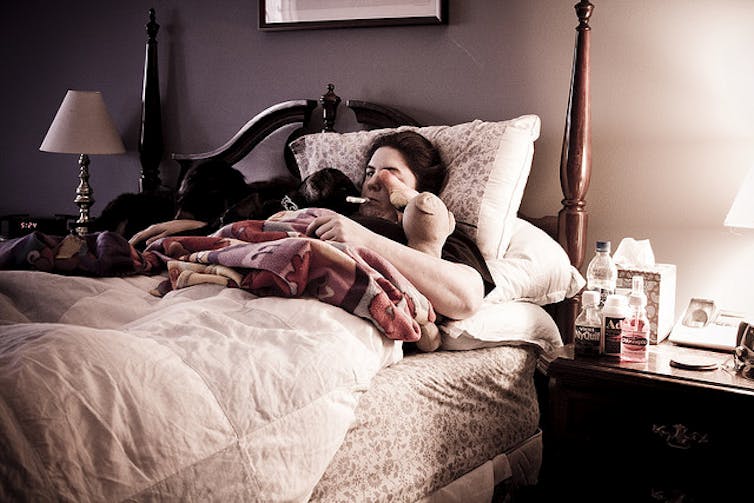If you typed “pins and needles” into Google, what kind of results would you expect to find? According to a recent study from Bupa Health, the search engine could diagnose you with anything from a completely reversible vitamin B12 deficiency, to sciatica, or worse, multiple sclerosis.
Entering “stomach cramps” into Google returns indigestion, appendicitis, or something as serious as heart disease or angina. Even a condition as benign as a rash comes up with dermatitis, psoriasis, eczema, or much more serious diseases such as meningitis.
No wonder there’s a dedicated term to describe patients who develop paranoia from googling their symptoms – cyberchondria.
The most recent statistics about Australians’ computer use shows around 80% of us now have access to the internet at home and the use of mobile devices is on the rise, thus nearly all of us can access the world-wide-web 24/7. Google is the search engine of choice for 93% of us, so when it comes to sourcing information about our health and medications, Dr Google seems an obvious place to go.
The Bupa study also revealed that: approximately a third (34%) of us would like to have the ability to text an image of our problem to receive a diagnosis; 45% would like to have access to our doctor by email; half of us self-diagnose; and 70% research our medications online. But while there is a plethora of information available online, it remains largely unregulated.
So how can you determine if the health information you find is accurate?
Well, mostly you can’t. In fact studies analysing the accuracy of Google results for the search term “vaccination” reveal 60% are actually against vaccination. (Interestingly searching “immunisation” is more likely to return accurate results since people opposed to vaccination do not believe that vaccination induces immunity).
All of this has created a difficult scenario for health care practitioners and patients alike. A patient could self-diagnose mild abdominal pain as constipation, for example, when they might have gallstones. Or on the flip side, another patient could incorrectly diagnose their headaches as meningitis.
Some doctors are justifiably worried that patients are diagnosing and treating themselves, using devices such as a gastric bypass surgery kit which was sold on Amazon. Or apps to scan moles and determine if they’re cancerous.
But while some doctors are frustrated by patients’ desire to research their conditions online, others are resigned to the fact it will happen, so are prepared to help guide patients to accurate information on the web.

My top ten health websites
No website is completely free of errors or spurious or out-of-date information, so you will always need to exercise scepticism. A few rules of thumb include checking the date the information was updated, checking the “about us” section for the author’s/publisher’s qualifications and reputations. Also look for any evidence of peer review published data, as opposed to testimonials.
The Australian government offers accurate, consumer-driven information that’s generally kept up to date. Of note is its vaccination information which provides easy to read information for parents (the “Understanding Childhood Immunisation Booklet”, is just one example). The government’s National Prescribing Service and Health Insite provide consumer-driven health information, as do state government websites such as the Better Health Channel in Victoria.
The commercial My Doctor website will give you comprehensive local health and medical information from the MIMS medical reference tool.
Concise and accurate fact sheets on vaccination can be found at the National Centre for Immunisation Research and Surveillance (NCIRS) and facts sheets on other medical conditions are available from the Consumer Health Forum.
Other international sources include WebMD, The Mayo Clinic, NIH Health and the National Cancer Institute, which are all good places to find reliable and easy-to-understand medical information.

There are also a number of crowd-sourced tools that indicate the quality of a site, based on user experience. Web of trust (WOT) is a browser plug-in which rates sites from green (good) to red (bad) depending on consumer reviews compiled from four categories: trustworthiness, reliability, child safety and privacy.
The HON (Health on the Net Foundation) Code is the oldest rating system and was founded in 1995 by the Economic and Social Council of The United Nations to encourage the dissemination of quality health information for patients, professionals and the general public.
If you come across information that makes you suspicious, you can always google it with the word “sceptic” or “debunk” and you’ll usually find several blog posts that offer a second opinion. A large community of scientists and health professionals lurk on the intertoobs and take great pleasure in applying their expertise to debunking suspicious and spurious medical claims. Science Based Medicine is one such multi-author blog, with contributions from pharmacists, cancer specialists, neurologists, infectious disease doctors and researchers.
The important thing to remember about researching health information online is to be sceptical, be critical, and never replace the trained eye and diagnosis of an experienced health professional with diagnosis by Dr Google. The internet can assist you, perhaps even calm your fears temporarily (or not, as case may be) but it will never replace the expertise of your doctor.
Finally, respect your doctor. Don’t be fooled into thinking you know more than them just because you’ve spent a few hours at Google University.
This list of websites is by no means exhaustive, so please feel free to add your favourites in the comments section below.

